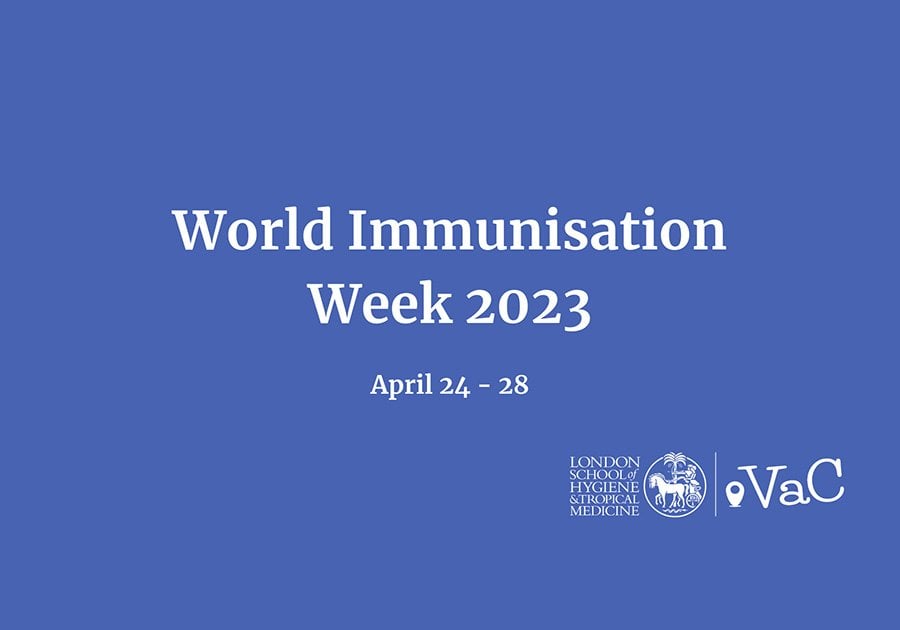Vaccinating women in pregnancy has emerged as a promising tool to protect women against infectious diseases and tackle infant morbidity and mortality worldwide. LSHTM Vaccine Centre World Immunisation Week activities will showcase the development of new maternal vaccines and provide the opportunity to discuss other vaccines with potential positive health outcomes.

World Immunisation Week 2023
On Day 1, Monday 24 April, we will launch World Immunisation Week (WIW) with a hybrid seminar on ‘The Current and Future Landscape of Maternal Immunisation’. Professor Beate Kampmann (Charité Berlin/LSHTM) will provide the biological and historical background for maternal vaccination, setting the scene for presentations on the development of Group B Streptococcus (GBS) and Respiratory Syncytial Virus (RSV) vaccines. Dr Robert Mboizi (MU-JHU Uganda) will present on Ugandan GBS vaccine trials and Dr Simon Procter (LSHTM) will provide an analysis on the global value of GBS maternal vaccines. Professor Paul Heath (St George’s, University of London) will review the RSV vaccine pipeline and Dr David Hodgson (LSHTM) will discuss mathematical models that evaluate the cost-effectiveness of RSV prevention interventions.
Day 2, Tuesday 25 April, will see LSHTM’s Malaria Centre and Vaccine Centre co-host a hybrid seminar to mark World Malaria Day and WIW. With the approval of RTS,S and promising results from the R21 trial, the landscape for malaria vaccines is taking a more positive turn. Dr Magloire Natama, from the Institute de Recherche en Sciences de la Santé in Burkino Faso and a LSHTM SMC & RTS,S trial investigator will focus on falciparum vaccines and Dr Mimi Hou, University of Oxford, will investigate the pipeline for vivax vaccines. The Q&A session will be an opportunity to discuss the relative benefits and challenges (financial, scientific, and delivery) to access for potential beneficiaries, including pregnant women.
On Day 3, Wednesday 26 April, Dr Ed Parker will host a webinar showcasing work on maternal immunisation by ECRs at LSHTM and beyond. Presentations will span the interplay between maternal and infant pertussis immunisation, maternal vaccination acceptance in sub-Saharan Africa, and in vitro models for studying the transfer of antibodies across the placenta.
Day 4, Thursday 27 April 2023, will start with a focus on Hepatitis E vaccination and implementation research. This webinar is jointly organised by the International Vaccine Institute (IVI) and the London School of Hygiene & Tropical Medicine (LSHTM) and will be co-chaired by Dr Rejwana Haque Pial from IVI and Dr Kiesha Prem from LSHTM. Dr Anh Wartel will introduce IVI and Dr Tracey Chantler will introduce the Vaccine Centre at LSHTM. Dr Katerina Rok Song from IVI will present on Hepatitis E vaccination in pregnant women, and Dr Debra Jackson from LSHTM will present on implementation research for vaccination programmes.
Day 4 activities will continue with an evening hybrid seminar focused on Shigella vaccines. Professor Daniel Cohen from the Sackler Faculty of Medicine at Tel Aviv University will present the main strategies of Shigella vaccine development and the breakthrough achieved in Shigella vaccinology by the parenterally delivered detoxified Shigella O-SP conjugate vaccines. A fey focus will be the immunogenicity of a novel vaccine candidate, a S. flexneri 2a synthetic glycan-based conjugate.
On Day 5, Friday 28 April, WIW activities will culminate with a hybrid seminar on ‘Maternal participation in vaccine trials’, chaired by Dr Luisa Enria from LSHTM. Pregnant and breastfeeding women are often automatically excluded from global vaccine research, development, and deployment during epidemics, despite being at elevated risk. Through case studies from the Ebola vaccine trials in the Democratic Republic of Congo and Sierra Leone, Dr Lys Alcayna- Stevens (KU Leuven & Harvard) and Sandrena Fischer (Ethox Centre, Oxford) will discuss contested decisions about whether to include or exclude pregnant women from potentially life-saving prophylaxis during vaccine trials, and examine the impacts on women’s lives of vaccine trials and of the deployment of emergency-use vaccines during health emergencies.
More information, along with zoom links, will be disseminated prior to WIW. Please keep an eye on this event page, our twitter and remember to sign up to our mailing list for email reminders!
All events will be recorded with recordings available after the WIW. If you have any questions, please contact vaccines@lshtm.ac.uk.
If you enjoyed this article and would like to build a career in global health, we offer a range of MSc programmes covering health and data, infectious and tropical diseases, population health, and public health and policy.
Available on campus or online, including flexible study that works around your work and home life, be part of a global community at the UK's no.1 public health university.

